UN expert warns welfare cuts fueling global far-right rise: WP
UN Special Rapporteur Olivier De Schutter warns that global welfare cuts are fueling far-right populism and social division, urging renewed investment in social protection.
-

Olivier De Schutter, UN special rapporteur on extreme poverty and human rights, addresses a press conference in Dhaka, Bangladesh, on May 29, 2023. (AP Photo/Al-emrun Garjon)
Olivier De Schutter, the United Nations Special Rapporteur on extreme poverty and human rights, is set to deliver a report to the UN General Assembly warning that austerity measures and cuts to social spending are directly contributing to the rise of far-right political movements around the world.
In his report, De Schutter links widespread discontent over reduced welfare protections to the growth of anti-establishment populism in both Europe and the United States. The growing popularity of figures such as President Donald Trump, France’s National Rally, and Germany’s Alternative for Germany (AfD) reflects, he argues, a deepening frustration with a system many feel has abandoned them.
"Far-right populists appeal to a growing share of voters by combining anti-elite sentiment with an ‘us’ against ‘them’ mentality," De Schutter noted, adding, "This messaging is particularly attractive to voters who fear losing their status and feel threatened by cultural and economic change."
Welfare programs that once united societies are increasingly seen as divisive. Far-right parties frequently target immigrants and minority groups, accusing them of exploiting public benefits. In Britain, some political actors have attacked efforts to temporarily house asylum seekers, while in the US, Republicans have falsely linked government shutdowns to proposals for free healthcare for undocumented immigrants.
De Schutter emphasizes that these narratives undermine social cohesion and weaken public support for universal welfare systems. "One of the most corrosive things we’ve seen in recent years is this idea that social protection is costly and should only go to those who ‘deserve’ it," he said.
Far-right politics fueled by inequality and economic fear
The report contends that economic inequality and insecurity, especially in the context of globalization and technological change, are central drivers of populist politics. De Schutter warns that diminishing social safety nets leave communities vulnerable, fostering resentment and mistrust.
"The cultural reasons for why the far right is rising, the distaste for others and overt xenophobia, are because people don’t feel protected from falling behind," he said, adding: "People trust less, invest less in civic life, and see others as competitors, including for access to benefits."
Even Europe’s historically robust welfare states are facing growing pressure. In November, European Central Bank President Christine Lagarde warned that Europe’s social spending and entitlement systems could be at risk without stronger economic performance. The return of Trump to office further unsettled European leaders, many of whom have redirected focus toward military spending, potentially at the expense of social programs.
In Germany, Chancellor Friedrich Merz declared that the country's welfare system was unsustainable, warning of "painful decisions" ahead. "We simply can no longer afford the system we have today," Merz said.
In France, resistance to pension reforms has rocked President Emmanuel Macron’s government, contributing to political instability and growing disillusionment among younger generations. France spent 31.5% of its GDP on social protection in 2023, the highest in Europe, but rising debt, stagnant wages, and an aging population are placing increasing strain on the system.
As governments weigh welfare cuts, De Schutter calls for a renewed vision of social protection. “Welfare is not a luxury for a society, not something we can dispense with in times of crisis,” he said.
He argues that the success of 20th-century welfare systems lay in their universality, which helped reduce inequality and build social capital. Reviving this ethos, he says, is key to restoring public trust and unity. “There’s a growing need to change the way we speak about poverty and welfare support,” De Schutter concluded. “We must stop blaming people in poverty for their conditions. Social protection is not just a cost, it’s an investment.”

 4 Min Read
4 Min Read









